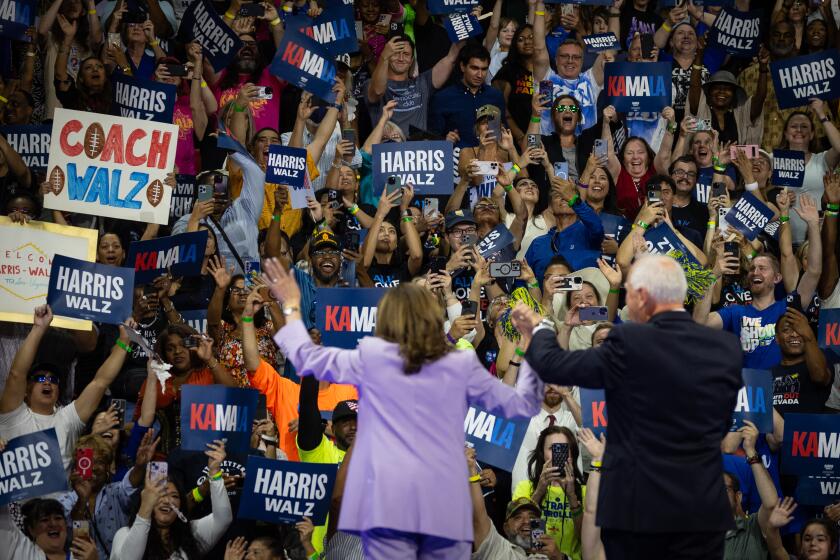Amid pressure, Pelosi shifts on offshore drilling
Democratic House Speaker Nancy Pelosi is considering legislation that would permit new offshore drilling as part of a broad energy bill, a response to growing anxiety within her party that Republicans are gaining traction with election-year attacks that Democrats aren’t doing enough to address high gasoline prices.
One proposal under consideration would let states decide whether to permit new energy exploration off their coasts while possibly maintaining the drilling ban off the Pacific Coast, according to a House leadership aide who requested anonymity because of the sensitivity of ongoing negotiations.
Pelosi has long opposed lifting the drilling ban but has come under pressure from members of her own party -- including freshmen in tough reelection campaigns -- to allow a vote on offshore drilling. Adding to that, Democratic presidential candidate Barack Obama recently said that he would be open to limited offshore drilling if it was part of a broader energy compromise.
A vote is likely to be held next month, after the House returns from its summer recess.
What exactly would be voted on was still being discussed Wednesday. Democrats are expected to insist that any bill include some of their priorities, such as the repeal of oil industry tax breaks and a requirement that utilities generate more electricity from cleaner energy sources.
Those measures, which have drawn GOP opposition, could complicate the passage of any measure. That is especially true in an election year, with time running out on the congressional session and partisan tensions running high.
Pelosi said on CNN’s “Larry King Live” this week that she would consider a vote on offshore drilling but that “it has to be part of something that says we want to bring immediate relief to the public and not just a hoax” -- part of a broader package that would probably include investment in alternative energy sources, releasing oil from the Strategic Petroleum Reserve and targeting speculation in energy markets.
Pro-drilling forces remained suspicious.
“Just because a bill comes to the floor with ‘offshore’ and ‘energy’ in the title doesn’t mean it’s a good offshore drilling bill,” said Brian Kennedy, a former House Republican leadership aide who is now with the Institute for Energy Research, a Washington group that promotes free-market energy policies. “Speaker Pelosi is only going to schedule a vote on an offshore energy bill if she believes it would be politically perilous not to, and even then it’s not going to have much energy in it.”
President Bush and Republican presidential candidate John McCain have called for lifting the long-standing ban on new offshore drilling, but Pelosi has called the proposal an election-year ploy by oil industry allies. She has said that new offshore drilling would provide no immediate relief from high gas prices and that, even in the long run, it would have only a negligible effect on energy costs at potential risk to the environment.
At least 31 Democrats have signed on as cosponsors of legislation to permit new drilling 25 miles off the coast -- or, if states object, 50 miles offshore. The number of Democratic supporters is expected to grow once lawmakers get an earful from their constituents about high gasoline prices, said Dave Helfert, a spokesman for Rep. Neil Abercrombie (D-Hawaii), one of the bill’s chief sponsors. Counting Republicans, the bill has 124 House sponsors.
The bill should get the support of oil-patch Democrats, or those from petroleum-producing states, plus the backing of some Democrats who have previously voted against new offshore drilling. It includes measures aimed at attracting more Democratic support, such as funding for such party priorities as development of alternative fuels, like solar and wind power, and energy assistance to low-income households.
The idea of letting states decide whether to permit drilling has gained support in the Senate too. A bipartisan group of senators recently unveiled a compromise that would let Virginia, North Carolina, South Carolina and Georgia decide whether to allow drilling 50 miles off their shorelines.
Drilling opponents are stepping up their efforts to preserve the ban.
MoveOn.org Political Action, which supports the election of candidates favoring the MoveOn.org agenda, has run radio ads in some GOP-held districts attacking the incumbents for accepting oil industry campaign contributions and calling new offshore drilling a gimmick that wouldn’t produce oil for years.
The ad also accuses GOP lawmakers of being more interested in “political stunts than honest solutions,” a reference to the Republicans who have stayed behind on the House floor during the summer recess to criticize Democrats -- even with the cameras and microphones off -- for leaving town without acting on major energy legislation.
The issue has presented Pelosi with a sticky political problem. On one hand, with gas prices on voters’ minds, public support for offshore drilling has increased, even in California, where a 1969 oil spill devastated the coast off Santa Barbara. Republicans have spotlighted Pelosi’s opposition to new coastal drilling in attacks on Democrats throughout the country.
But the drilling ban has long been a priority for environmentalists, an important Democratic constituency, and party leaders prefer to shield their members from politically tough votes close to an election.
Rep. Tim Walz (D-Minn.), who supports the bill sponsored by Abercrombie and Rep. John E. Peterson (R-Pa.), called it a good compromise.
Not only does the measure “show the public that we’re going to do something” about gas prices, he said, but it includes elements meant to win the support of lawmakers, like him, who are outside the oil patch and want to develop alternative energy sources in their districts.
Rep. Jim Costa (D-Fresno), another cosponsor of the Abercrombie-Peterson bill, said that more than 50 House Democrats would probably support a balanced energy package that would include new offshore drilling.
“And I’ll bet you when members come back from their districts, you’ll find more movement taking place,” he said.
Costa said that he told Pelosi during a recent meeting that “it’s nonsensical that it’s safe to drill off the coast of Texas and Louisiana and Mississippi, and yes, California, but it’s not safe to drill anywhere else. . . . The average hardworking American doesn’t understand that.”
But Rep. Lois Capps (D-Santa Barbara), a leading opponent of new offshore drilling, said in a statement that although she was “always concerned about the push for more drilling off our coasts from the oil industry and its supporters,” she hadn’t seen “a huge erosion of support for the moratorium among Democrats.”
“Holding a vote on a policy to keep doing more of the same drill-only strategy makes no sense, and I don’t think that you’ll see the Congress do that,” she said.
--
More to Read
Get the L.A. Times Politics newsletter
Deeply reported insights into legislation, politics and policy from Sacramento, Washington and beyond. In your inbox three times per week.
You may occasionally receive promotional content from the Los Angeles Times.











